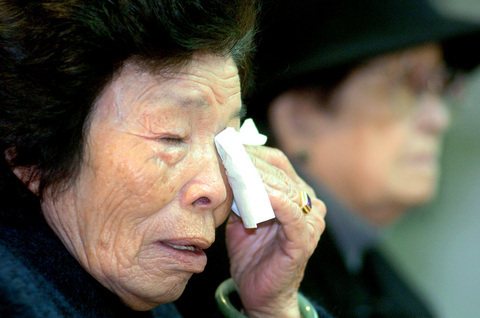Frustrated by the Japanese High Court's rejection of compensation for Taiwanese women forced to work as sex slaves for the Japanese army during World War II, activists will today launch a worldwide signature drive which they will eventually submit to the UN.
"The ruling, which is based on postwar treaties, is a slap in the face," said Cheng Chen-tao (鄭陳桃), an 83-year-old former sex slave, or "comfort woman," who filed a suit with eight other former wartime sex slaves. "I don't need any monetary compensation. I just want the world to know what the Japanese government did to comfort women, and that we deserve an official apology," she said.
Organized by the Taipei Women's Rescue Foundation, which has been supporting Taiwanese comfort women for 11 years, today's campaign includes a street march and a petition drive in front of the Tansui MRT station.

PHOTO: SEAN CHAO, TAIPEI TIMES
Activists hope to gather 1 million signatures from nations where women were forced into sex slavery by the Japanese during World War II, including Korea, the Philippines, China, Indonesia and the Netherlands. The petition, which demands that Japan take legal responsibility for the crime, will be submitted to the UN in April, the foundation said.
Foundation president Kevin Liao (廖英智) said yesterday during a press conference that activists are now considering taking the case to the International Criminal Court.
"In addition, we call on the government of Taiwan to include the enslavement of the nation's women in history textbooks, as well as establish a cenotaph at a military warehouse in Hualien, where comfort women were held and abused," Liao said.
The foundation hopes to educate the public about this tragic chapter in Taiwan's history by documenting the stories of former comfort women.
Chinese Nationalist Party (KMT) Legislator Wang Yu-ting (王昱婷) said the Japanese government should also face their history with honesty.
"What Japan did to comfort women is a violation of human rights, which has no expiration date for demanding compensation. We will keep pressuring the Japanese government until it offers a formal apology," Wang said.
In February, Japan's High Court rejected the suit brought by nine Taiwanese comfort women, saying that a 20-year period for demanding compensation had expired, and that international treaties state that reparations had to be made to states, not individuals.
It was the second legal defeat for the women, who were appealing an October 2002 ruling by the Tokyo District Court.
The women claimed that they were victims of sexual abuse by the Japanese army and that they continued to suffer discrimination after the war. Cheng said she was kidnapped on the way to school at the age of 18 and forced to work as a comfort woman.
"Relatives said that I bring shame to the family and asked me to leave after I went home. The only reason why I didn't commit suicide over the years is that I am still waiting for an apology," Cheng said while wiping away tears. According to the foundation, more than 50 suits have been filed against Japan over its wartime enslavement of women, mainly from South Korea and China.
Over the last few years, Taiwanese groups have cooperated with foreign NGOs to demand justice and repatriations from the Japanese government.
Lin said that legislators will work with the government to lobby the Japanese parliament to pass legislation that would allow the state to compensate Taiwanese comfort women.

Taiwan is stepping up plans to create self-sufficient supply chains for combat drones and increase foreign orders from the US to counter China’s numerical superiority, a defense official said on Saturday. Commenting on condition of anonymity, the official said the nation’s armed forces are in agreement with US Admiral Samuel Paparo’s assessment that Taiwan’s military must be prepared to turn the nation’s waters into a “hellscape” for the Chinese People’s Liberation Army (PLA). Paparo, the commander of the US Indo-Pacific Command, reiterated the concept during a Congressional hearing in Washington on Wednesday. He first coined the term in a security conference last

Prosecutors today declined to say who was questioned regarding alleged forgery on petitions to recall Democratic Progressive Party (DPP) legislators, after Chinese-language media earlier reported that members of the Chinese Nationalist Party (KMT) Youth League were brought in for questioning. The Ministry of Justice Investigation Bureau confirmed that two people had been questioned, but did not disclose any further information about the ongoing investigation. KMT Youth League members Lee Hsiao-liang (李孝亮) and Liu Szu-yin (劉思吟) — who are leading the effort to recall DPP caucus chief executive Rosalia Wu (吳思瑤) and Legislator Wu Pei-yi (吳沛憶) — both posted on Facebook saying: “I

Sung Chien-liang (宋建樑), who led efforts to recall Democratic Progressive Party (DPP) Legislator Lee Kun-cheng (李坤城), was released on bail of NT$80,000 today amid outcry over his decision to wear a Nazi armband to questioning the night before. Sung arrived at the New Taipei District Prosecutors’ Office for questioning in a recall petition forgery case last night wearing a red armband bearing a swastika, carrying a copy of Adolf Hitler’s Mein Kampf and giving a Nazi salute. Sung left the building at 1:15am without the armband and covering the book with his coat. Lee said today that this is a serious

A mountain blaze that broke out yesterday morning in Yangmingshan National Park was put out after five hours, following multi agency efforts involving dozens of fire trucks and helicopter water drops. The fire might have been sparked by an air quality sensor operated by the National Center for High-Performance Computing, one of the national-level laboratories under the National Applied Research Laboratories, Yangmingshan National Park Headquarters said. The Taipei City Fire Department said the fire, which broke out at about 11am yesterday near the mountainous Xiaoyoukeng (小油坑) Recreation Area was extinguished at 4:32pm. It had initially dispatched 72 personnel in four command vehicles, 16